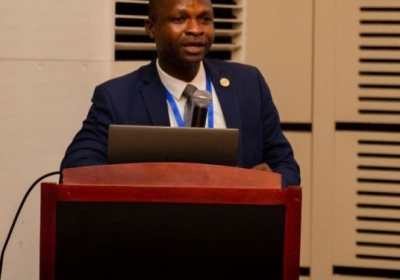"Understanding Ghana's Economic Landscape: Dr. Bannor Advocates for a Global Perspective"

Dr. Frank Bannor, a distinguished Development Economist and Head of Research at the Danquah Institute (DI), has raised a critical alarm regarding the ongoing discourse about Ghana's economic situation, emphasizing the imperative of recognizing global economic forces. During an insightful interview on the ADOM TV BADWAM Show on Monday, October 28, 2024, he vehemently cautioned against the tendency to downplay or entirely overlook the significant impacts of external factors on Ghana's economy.
In his analysis, Dr. Bannor stressed that neglecting the influence of exogenous variables—external forces such as the COVID-19 pandemic and the geopolitical ramifications of the Russia-Ukraine war—would not only be misleading but could also be characterized as “political propaganda.” He highlighted the undeniable interconnectedness of today’s global economy, noting that local economies do not operate in isolation. The economic fortunes of nations are now increasingly entwined, influenced by issues that transcend borders and geopolitical divisions.
"These outside factors must be considered in order for economic analysis to be complete and accurate," Dr. Bannor asserted, explaining that such factors significantly affect various economic metrics, from inflation rates to the stability of national currencies. He argued that the notion that these exogenous forces do not affect the global economy is a flawed perspective that hinders the formulation of effective economic policies.
To illustrate his point, Dr. Bannor referenced a recent report by Reuters titled “Volkswagen Weighs Wage Cuts, Bonus Reductions,” which underscores how even global giants like Volkswagen are compelled to navigate the turbulent waters of a shifting economic landscape. He elaborated that the company is considering a series of cost-cutting strategies, including a potential 10% wage reduction and a two-year freeze on salaries, aiming to save approximately 4 billion euros. Furthermore, Volkswagen’s leadership has been contemplating measures such as capping bonuses for senior employees and limiting additional payments linked to employee anniversaries, all amid discussions about potentially shuttering some production sites in Germany.
Dr. Bannor indicated that these corporate strategies reflect broader economic realities and pressures stemming from the global market's dynamic environment. Any assertion suggesting that external forces do not influence economies worldwide, he reiterated, constitutes a form of “political propaganda.”
Drawing further parallels, he examined recent economic maneuvers in China, where the central bank has implemented low-interest loans at a mere 2.27% to stimulate local business investment—an explicit response to the ongoing shifts in the global economy.Dr. Bannor stated that this approach might be seen as essentially offering gratuitous financial support to stimulate growth in current tumultuous conditions, emphasizing that Ghana's economic difficulties should not be examined in isolation but rather in relation to broader global economic trends.
Delving into the historical context of Ghana’s economic management, Dr. Bannor reflected on the trajectory of the economy under various administrations. He pointed out that when the New Patriotic Party (NPP) came to power, the economy was experiencing a growth rate of 3.4% in 2016, a figure recorded during the tenure of the National Democratic Congress (NDC). By the end of 2017, however, this growth had surged to an impressive 8.3%. Dr. Bannor highlighted the marginal growth rates under previous governments to provide a comparative perspective, noting that during President Kufuor's administration in 2006, the economy achieved just over 6% growth, a trend that continued through President Mills' tenure, where growth rates remained relatively stagnant.
The introduction of oil production in Ghana in 2011 marked a pivotal moment, propelling the nation’s GDP growth to a remarkable peak of 14%. However, this growth was short-lived, declining to 8.4% in 2012 and further plummeting under President Mahama's administration, where growth rates dipped to as low as 2.8% in 2014 and reached a concerning 2.12% in 2015. Dr. Bannor emphasized that these declines occurred without the presence of significant global crises like the COVID-19 pandemic or the Russia-Ukraine conflict, highlighting that ineffective economic management and declining commodity prices were key contributors to the situation that necessitated Ghana's recourse to an International Monetary Fund (IMF) program in 2015, a decision he characterized as a move for “financial assistance” rather than mere credibility.
Reflecting on the NPP's administration from 2017 to 2019, Dr. Bannor noted that Ghana experienced an average economic growth rate of approximately 6% before the onset of the COVID-19 pandemic. Citing data from the IMF, he indicated that Ghana’s economy was on track to grow by 7.2% in 2020, a testament to sound fiscal policies. However, the pandemic resulted in a significant downturn, reducing growth to a mere 0.5%.
By 2021, Ghana began to emerge from this setback, achieving a remarkable recovery with a growth rate of 5.1%, noted as one of the fastest recoveries among nations in the Global South according to IMF statistics. Despite further external shocks due to the Russia-Ukraine conflict in 2022, Ghana has managed to maintain a relatively robust economic performance, evidenced by a second-quarter growth rate of 6.9% in 2023—among the highest in Africa and outperforming larger economies such as Nigeria, Kenya, Egypt, and South Africa. The fact that inflation fell to 7.9% in 2019—the lowest rate in decades—was highlighted by Bannor as evidence of the effective economic management that had taken place before the recent global crisis.
In conclusion, Dr. Bannor’s comprehensive analysis serves as a potent reminder of the complexities and interdependencies within the global economy, urging policymakers and stakeholders in Ghana to acknowledge these factors in their discussions and decision-making processes. His insights underscore the need for a nuanced understanding of both domestic and international economic landscapes to effectively navigate the challenges ahead.







